Advertisement
Robots And Reboots — A Science Fictional Summer At The Movies
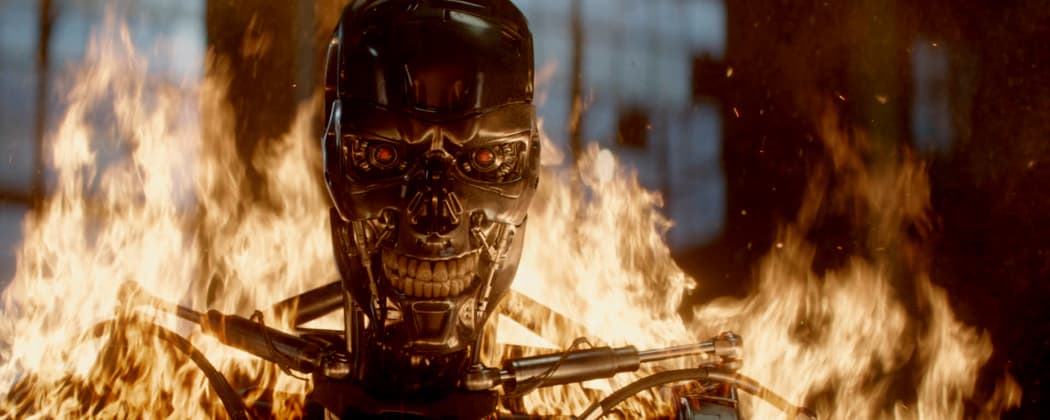
In the Paleozoic era before “Star Wars” and “Jaws” (which, incidentally, celebrated its 40th birthday this June), movie moguls of yore once thought the dog days of summer were a box office dead zone.
Not any more.
A gold vein runs through our hottest season, and Hollywood mines it with tools as powerful as Thor’s hammer, Mjölnir. Much of that vein is easily-digestible and popcorn-flavored: pretty lights, fancy camera (and special effects) and plenty of action.
In other words, science fiction.
As we close in on the Fourth of July, the approximate half-way mark of summer — and Hollywood’s All-Star Break between its blockbuster bookends of Memorial Day and Labor Day — let us take stock of our science fictional summer thus far. What ideas, anxieties and possible futures have these sci-fi fantasies and nightmares been plumbing?
To be sure, we don’t seem quite as obsessed with the apocalypse as we were the previous two summers. Sure, this season’s lineup has its share of explosions and end-of-the-world villain movies. Take “Avengers: Age of Ultron,” or “Terminator Genisys,” which opened this week. But overall, these plots don’t center quite as squarely on civilization-ending catastrophes. In the case of “Mad Max: Fury Road,” the wasteland is already here, so deal with it. Other issues are raised. As always, there’s a palpable fear of what’s to come. But how these movies confront that technophobia varies as wildly as a Stormtrooper’s aim with a blaster.
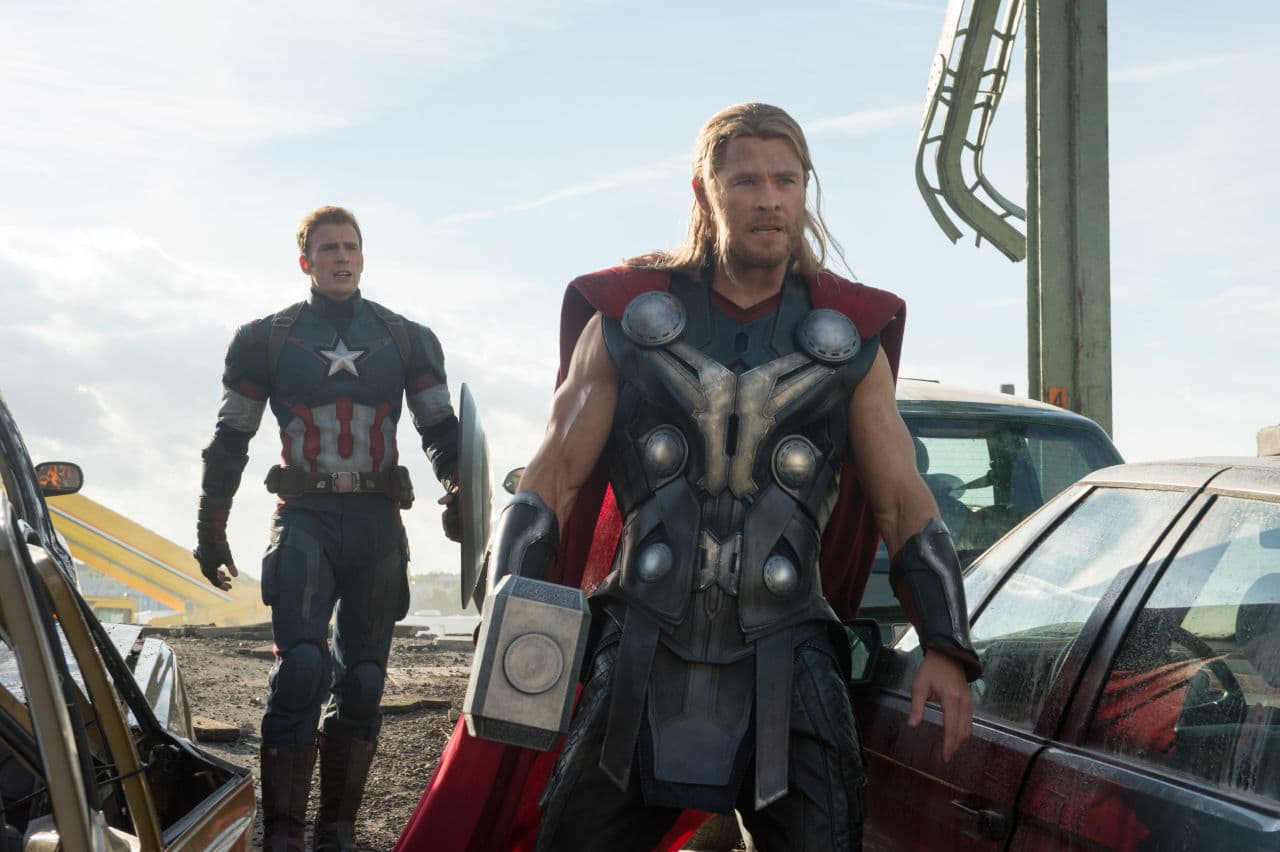
In the spring, it seemed we’d be treated to some smart speculations. “Ex Machina” (released in April) heralded a serious look at social issues. The creepy technological thriller concerns a young programmer (Domhnall Gleeson) who, much like Joaquin Phoenix in Spike Jonze’s “Her” (2013), falls for artificial intelligence. Only this A.I. is no non-corporeal Scarlett Johansson — or androgynous HAL 9000 or clunky C-3PO for that matter. Reclusive tech titan Oscar Isaac knows we like our futuristic tech to inhabit female bodies. So his Frankenstein monster arrives in the form of Alicia Vikander, whose smarts and every move are based on personal data harvested from billions of users of a Google-meets-Facebook search engine called Bluebook.
As a species, we’re getting a little less comfortable with our devices and all this digital connectivity. We're also becoming paranoid about social media. Another early entry, the James Bond spy send-up “Kingsman,” imagines evil genius Samuel L. Jackson trying to solve climate change by bumping off humankind. But he doesn’t dangle a doomsday device over the planet. He gives out a free smart phone chip that promises unlimited text, data and voice plans to the billions. When he pushes that red button, the chips make everyone fly into a worldwide killing rage. How’s that for crowdsourcing your diabolical scheme?
“Terminator Genisys” touches on a similar premise. We haven’t had a film in this series since 2009’s “Terminator Salvation,” and above all, the new installment is meant to be the triumphant return of Arnold Schwarzenegger. Unless you count his stint as the Governator, “Ahnuld” hasn’t played a cyborg since 2003’s “Terminator 3: Rise of the Machines.” So cue those “I’ll be back” jokes. Yes, Schwarzenegger does utter that line, as well as reminding viewers that “I’m old, not obsolete.”
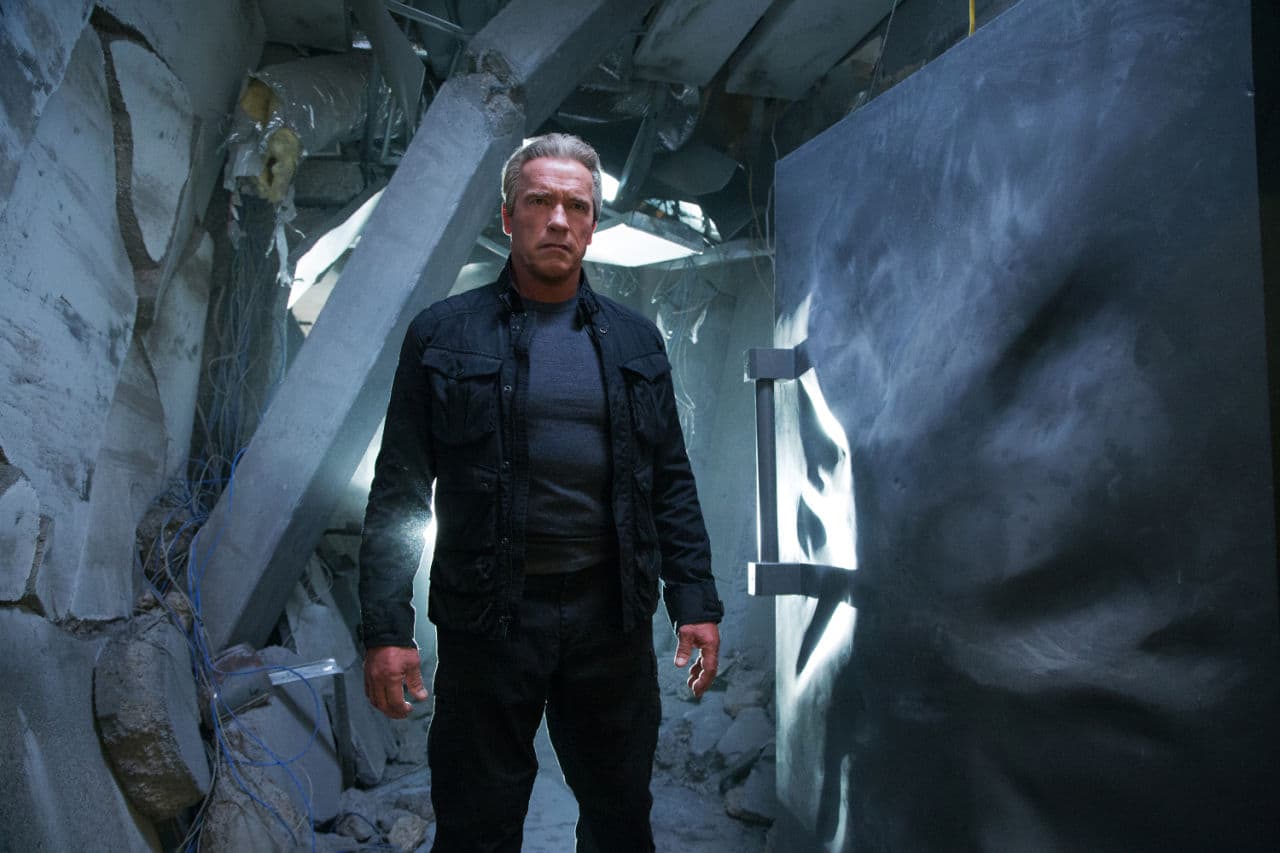
But in and around all the quantum field generators, John Connor talk and one-liners — please buzz me if you can sort out all the alternate futures and pasts — is a more insidious paranoia. Like with “Ex Machina” and “Kingsman,” in "Terminator Genisys," the nukes won’t spell our demise. It's Twitter and Snapchat that lead us to death's door. In one scene, as we see shots of everyday folks tethered to smart phones and tablets, someone in the film observes that humans are “inviting their own extinction in through the front door.” Our doom is Genisys, the “ultimate killer app” (yuk yuk!) about to be launched in 2017, one of the past story lines that the trio of Arnold, a younger Sarah Connor (Emilia Clarke from “Game of Thrones”) and Kyle Reese (Jai Courtney) time travel to. The flashy operating system will be installed on computers worldwide and promises to allow all our devices to talk to each other. Turns out that our 24/7 digital addiction is the way that insidious Skynet rises up and becomes our future robot overlord. Who knew?
The hubris of science is again under fire in “Jurassic World.” Despite the action having occurred some two decades after the events of the first “Jurassic Park,” and 14 years having passed since we saw the last episode, “Jurassic Park III” (2001), no one in this new chapter takes advantage of the ongoing story's accumulated lessons. Bryce Dallas Howard has been running a new dinosaur theme park for a decade sans incident. But of course that’s all going to change when a genetically modified dinosaur called the Indominus rex busts loose. Let’s get Chris Pratt, an ex-Navy man who knows how to train velociraptors, in there to clean up the mess. Silly geneticists, thinking they can tinker — once again — with mother nature.
Over in “Tomorrowland,” where a former boy dreamer is all grown up as a dour George Clooney, there’s a more cheery outlook on the future — but it comes with a dose of medicine. The silly fantasy, about a Disney-like theme park trapped in a Kennedy-era alternate dimension where dream can still reign, takes a swipe at our fasciation with zombie-filled doomsdays. Writer-director Brad Bird regularly stoops to lecture to his audience on what went wrong. Via his mouthpiece baddie Nix (Hugh Laurie), Bird complains that the media has “gobbled up” end-of-the-world narratives, in the guise of video games and binge-worthy TV shows and movies, “like a chocolate éclair.”
In fact, we’re all guilty: “The entire world wholeheartedly embraced the apocalypse, and sprinted towards it with gleeful abandon.” Those dystopian first-person shooters and “Hunger Games” death matches strip us of hope. Immersing ourselves in the end-of-the-world actually makes that future more likely. Why can’t we simply swoon for optimistic Star Trekkian SF anymore? It’s an absurd message from the guy who brought us “The Incredibles” and “Mission: Impossible – Ghost Protocol.”
Me, I prefer our fears to be shot like jets of smoke and fire across the blank Cineplex screen, a tabula rasa where we can deal with them. That’s the territory explored by “Mad Max: Fury Road.” Max (Tom Hardy) joins she-warrior Imperator Furiosa (Charlize Theron) on an impossible, but of course possible, mission to help three slave women escape The Citadel and the clutches of its master, Immortan Joe. He leads a Viking-like culture and a fanatical tribe, the War Boys, who are promised an afterlife in Valhalla should they fight valiantly. It’s a messy, sweeping, violent, overblown car chase of a movie that’s more operatic and fantastic than pure sci-fi. It reaches for something more mythic and grand than the Marvel or Terminator universes. Max begins by saying “You know hope is a mistake.” And by the end, Imperator Furiosa implores him, “You never gonna have a better chance.” Max asks “At what?” She grimly replies, “Redemption.” I prefer this blank slate wasteland upon which to project our dreams for renewal, rather than being given a “Tomorrowland” scolding.
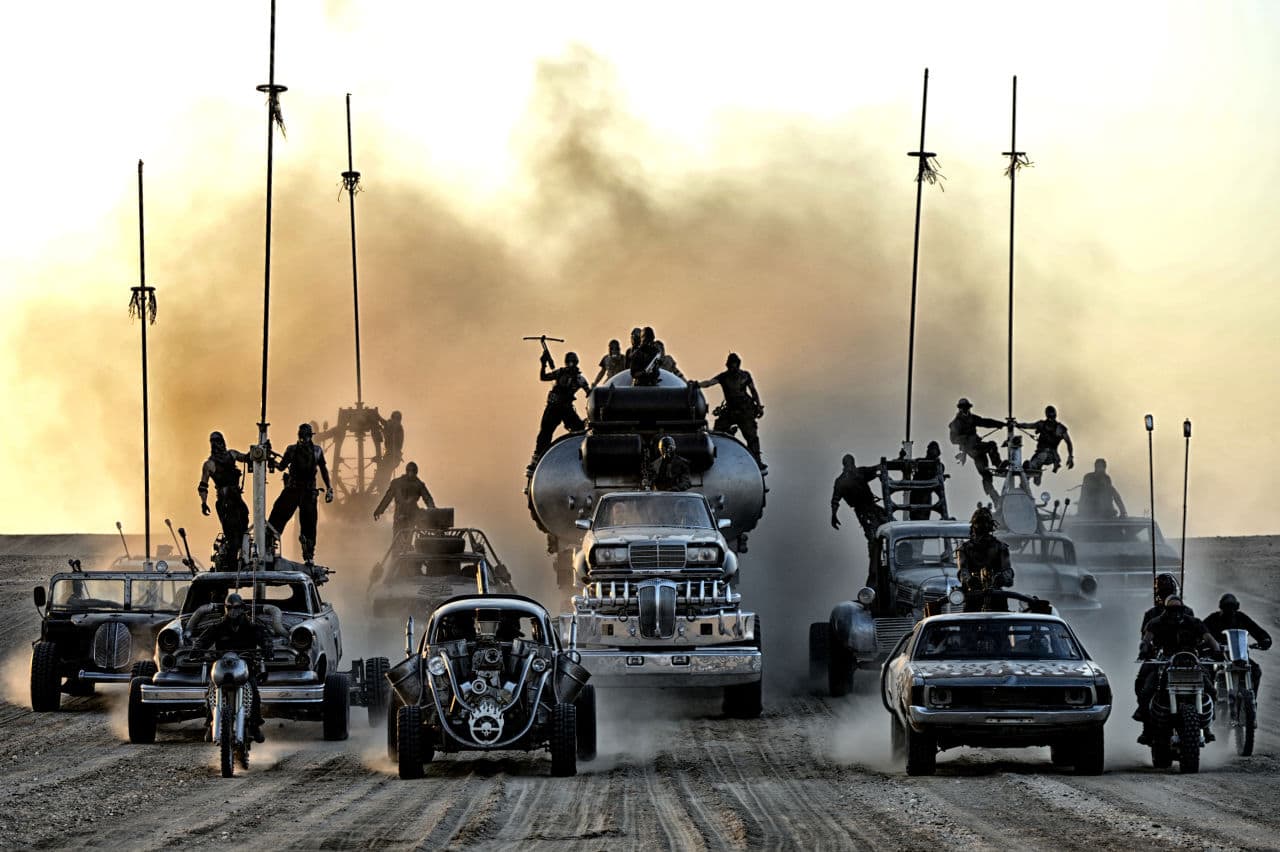
Some movies begin with the tease that serious social issues will be explored, only to end up merely a cool venue for action and violence. “Terminator Genisys” exemplifies this principle. Same with “Avengers: Age of Ultron.” Early on, there’s a discussion between Stark/“Iron Man” (Robert Downey, Jr.) and Banner/“The Hulk” (Mark Ruffalo) about whether to use the artificial intelligence they’ve found inside a magical scepter's gem. (It’s the same scepter once wielded by Loki, for those keeping track of Marvel’s intertwined story lines.) Stark wants to use the A.I. to create the ultimate global defense shield. Naturally, that plan goes awry, giving birth to the nasty Ultron (James Spader). Stark: “I tried to create a suit of armor around the world ... but I created something terrible. Bruce Banner: “Artificial intelligence...” Oh well.
Later, Stark’s HAL-like A.I. gets uploaded into a synthetic body and becomes the Vision. As Peter Bebergal wrote recently in Slate, “The Vision was an early incarnation of our essential dilemma with artificial intelligence. How humanlike do we really want our machines to be?” But comic book movies, rather than comic books themselves, are too noisy a backdrop to plumb deep questions about the effects of technology. Same with “Terminator Genisys,” a loud movie where many guns are fired, a base excuse for endless Rock'em Sock'em Robots cybernetic fistfights.
Ultimately, I predict, the legacy of this summer science fictional fare will be this: When in doubt, reboot our favorite franchises. Return to the past, via a Flux Capacitor trip back to the future. After all, “Terminator Genysis” travels to 1984, the year James Cameron released his original "Terminator" installment. Kids, look for the scene where Kyle Reese dons his Nike Vandals, the same sneakers that the original Reese (Michael Biehn) ran around in the first “Terminator” movie. Best of all, Arnold has his abs and deltoids back. Thanks to CGI effects, he even butts heads, with rutting-goat abandon, with the 1984 version of himself. The cassette deck is back, too. Like Chris Pratt in “Guardians of the Galaxy,” who tunes out to his Mom’s “Awesome Mix Vol. 1," Emilia Clarke keeps listening to "I Wanna Be Sedated" by The Ramones on her boombox. What a metaphor: Wouldn’t we be more comfortable back in the simpler Cold War Reagan Era, when we had villains we could see and face down — whether robots, Russkies or robot Russkies — not these terrorists skulking around? When we had better music?
Later this summer, we might get a couple sober blips on our sci-fi radars. In “Self/less” (July 10), billionaire industrialist Ben Kingsley defeats cancer by uploading his consciousness into the body of Ryan Reynolds. That could prove fruitful. But for the most part, we’ll be spreading gobs more nostalgic sauce on our cinematic fast food.
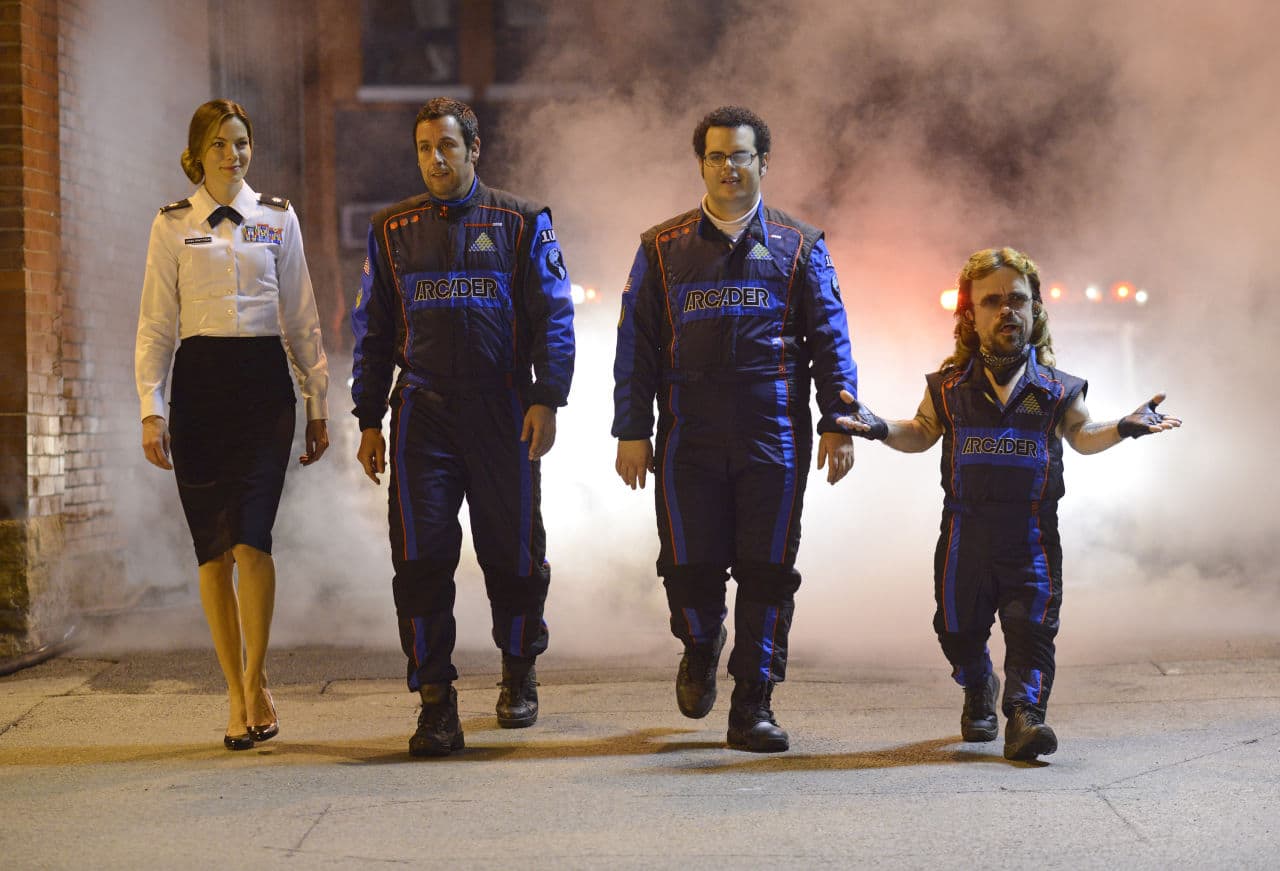
There’s “Pixels” (July 24), wherein old-school video gamers (Adam Sandler and Peter Dinklage) take on aliens whose space ships and invasion strategy are based on classic arcade games like Pac-Man and Donkey Kong. (The plot is surprisingly similar to Ernest Cline's (“Ready Player One”) forthcoming novel “Armada.” Lawsuit?). Also on the horizon are two more safe comic book entries: "Ant-Man" (July 17) and “Fantastic Four” (Aug. 7). But there’s also "Dark Star: H. R. Giger's World,” about the cultish Swiss sci-fi artist and visual designer of movies such as the “Alien” franchise. The brooding documentary, which opens Friday, July 3, in Cambridge, invites us to dream back to the days when our special effects were made of plastic and plaster, not pixels.
We thought it might be the summer of smart sci-fi. But it’s turned out to be the season of the science fictional reboot — old faves reborn: better (probably not), stronger (ditto), faster (certainly). It’s as if we’re all being primed for the ultimate nostalgia trip, “Star Wars: Episode VII — The Force Awakens,” coming this December. Our summer fare is whetting our appetites. We’re being set up to fall for old robots again, and to welcome the return of our favorite heroes.
I, for one, can’t wait for Christmas. Stormtroopers, better take target practice.
Ethan Gilsdorf is the author of “Fantasy Freaks and Gaming Geeks” and a frequent contributor to WBUR’s The ARTery and Cognoscenti. He also writes for The New York Times, Wired, Salon, Boston Magazine, BoingBoing and The Boston Globe. Contact him at www.ethangilsdorf.com or follow him on Twitter at @ethanfreak.

